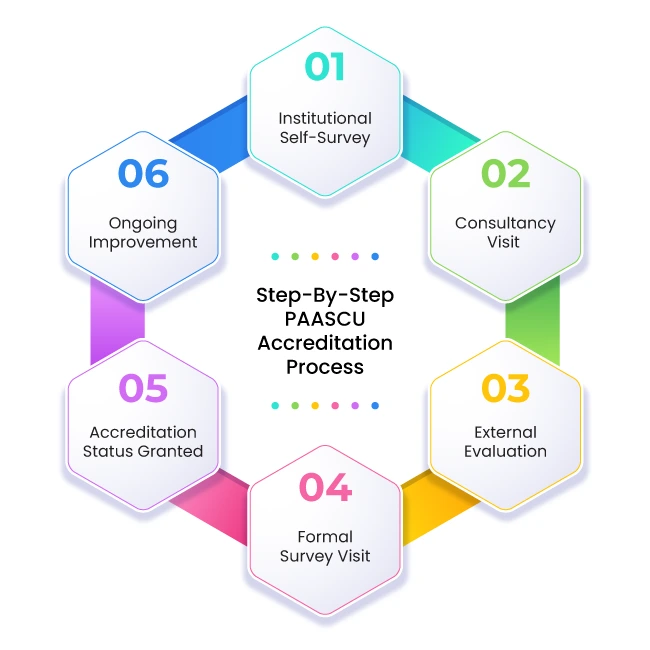Private educational institutes are a significant part of the Philippines’ education system and offer a wide range of curricula, including faith-based and international learning systems. However, the ever-evolving learning needs, industry demands, and national development goals can pose various challenges.
That is where PAASCU comes in and helps to regulate the educational quality by establishing specific standards for private educational institutions and programs.
But what is PAASCU, and how does it contribute to the Philippines’ education system? Let’s find out:
Understanding PAASCU
PAASCU, or the Philippine Accrediting Association of Schools, Colleges, and Universities, is a private, non-profit, and voluntary organization that was established in 1957. It is the country’s oldest accrediting agency and has been recognized by the Department of Education (DepEd) and Commission on Higher Education.
PAASCU actively participates in the global assurance networks and is the founding member of the International Network for Quality Assurance Agencies in Higher Education (INQAAHE) and the Asia-Pacific Quality Network (APQN). In effect, this indicates PAASCU’s dedication to elevating the country’s education system against international standards.
The PAASCU accreditation process focuses on the fourfold definition of quality, which encompasses the following:
- Fitness for Purpose—It relates to obtaining the institute’s and program’s goals, vision, and mission.
- Compliance with Set Standards—It relates to the DepEd and the CHED-set standards.
- Evidenced Excellence—It relates to accomplishing learning outcomes that demonstrate excellence according to the PAASCU’s standards.
- Responsiveness—It relates to addressing students’, parents’, staff, and the wider community’s needs and expectations.

Step-By-Step Accreditation Process
The PAASCU accreditation process includes elaborate and stringent procedures, which institutes must carry out systematically. Furthermore, it occurs in stages, which are as follows:
1. Institutional Self-Survey
The first step of the process entails institutions conducting a comprehensive internal examination of all their core functionalities. This helps assess their programs, operations, and services according to the predetermined standards and their own vision, mission, and goals. In effect, institutes succeed at assessing core aspects such as
- Governance and administrative structures
- Design and delivery of academic curricula
- Faculty and staff’s qualifications and professional development
- Student support services and their effectiveness
- Nature and impact of their research endeavors
- Adequacy and maintenance of their physical facilities and learning resources.
The ultimate outcome of an in-depth self-analysis is a self-survey report, an official document indicating the institute’s strengths and weaknesses. This document reflects an institute’s understanding of its current state and future aspirations and serves as a crucial foundation for subsequent external evaluation.
2. Consultancy Visit
A consultancy visit is an optional step for educational institutes that apply for the PAASCU accreditation process for the first time. A small team of expert accreditors visits the institute's campus before the formal survey and conducts discussions with key stakeholders.
Accreditors can gauge the institute’s self-identified strengths and problem areas and whether or not it is ready for formal evaluation. The consultancy visit also provides valuable insights and recommendations through expert feedback.
The feedback lays emphasis on the self-study report’s clarity and comprehensiveness, and areas that might require more clarification and attention prior to the formal survey.
3. External Evaluation
A team of peer evaluators visits the institution, the first formal on-site engagement with the PAASCU accreditors. The team carries out an initial assessment, helping to evaluate the institutional operations, interact with the main stakeholders, and verify the information in the self-study report.
The accreditors are able to conclude the institution’s capability of meeting PAASCU’s set standards within the stipulated timeframe. The preliminary survey team’s feedback is crucial for institutes as it helps to determine the following:
- Identify the areas where the educational institution aligns with the set standards.
- Highlight significant areas of improvement.
- Determine areas that will undergo systematic evaluation during the formal survey visit.
4. Formal Survey Visit
The formal survey visit entails a team of experienced peer accreditors visiting the institute for an in-depth on-site evaluation over a couple of days. They implement various methods, like extensive interviews with administrators, faculty, students, and alumni, to validate information in the self-survey report.
Also, the expert team takes part in direct observations by attending classes and analyzing instructional methodologies and learning environments. They review records, institutional documents, and data, helping to confirm compliance with PAASCU standards across all important areas.
Moreover, they inspect the infrastructure, including classrooms, laboratories, learning resources, and student support services. In effect, accreditors can develop an evidence-based conclusion of the educational institute’s overall quality and compliance with the standards.
5. Accreditation Status Granted
The accrediting team compiles a comprehensive report after the formal survey visit, and it includes a detailed report of their findings. The report highlights the areas where institutes excel and the areas that need further improvement.
The team submits the report to the PAASCU Board of Trustees, which is the ultimate decision-making authority. The board goes through the board’s report, engages in discussion, and provides a decision on the institute’s accreditation status.
If an educational institution substantially meets PAASCU’s set standards and indicates a commitment to continuous improvement and quality, it gets an initial accreditation status. This reflects the fact that the institute has undergone rigorous external validation and meets the quality benchmarks.
6. Ongoing Improvement
The accredited institutions undergo periodic re-survey visits, which are instrumental for ensuring standard maintenance. These re-evaluations occur every three to five years, depending on the accreditation level that has been granted to the institute.
The revaluation is similar to the formal survey visit and requires institutions to conduct a fresh self-survey, which helps to indicate the progress since the last accreditation. The PAASCU evaluator team revisits the campus to evaluate the institute’s adherence to the set standards.
Additionally, the team conducts document reviews and interviews, an important part of the procedure, which helps to decide the overall institutional quality. Consequently, a successful re-survey visit leads to accreditation renewal for a longer time, pointing out the institute’s commitment to ongoing improvement.
The Impact of PAASCU on Philippine Higher Education
PAASCU has played a crucial role in elevating the standard of education in the Philippines by setting quality benchmarks and encouraging institutions to strive for excellence. Its rigorous accreditation process, consultancy services, training programs for accreditors, and collaborative initiatives impact the country’s education sector and student learning experiences.
The accreditation serves as a mark of distinction and high-quality educational facilities, elevating the institute’s reputation among stakeholders. Besides, it improves an educational institute’s eligibility for funding, grants, and collaborations with international and national educational organizations.
Conclusion
PAASCU’s importance lies beyond being an accredited agency, as it is a community of educators and experts who strive to ensure quality education in the Philippines. It has established standards and benchmarks, enabling educational institutions to maintain quality across the curriculum, faculty, facilities, student services, etc.
Click for a digitally empowered campus
 Author :
Author :
Gaurav Somani,
Academic Consultant